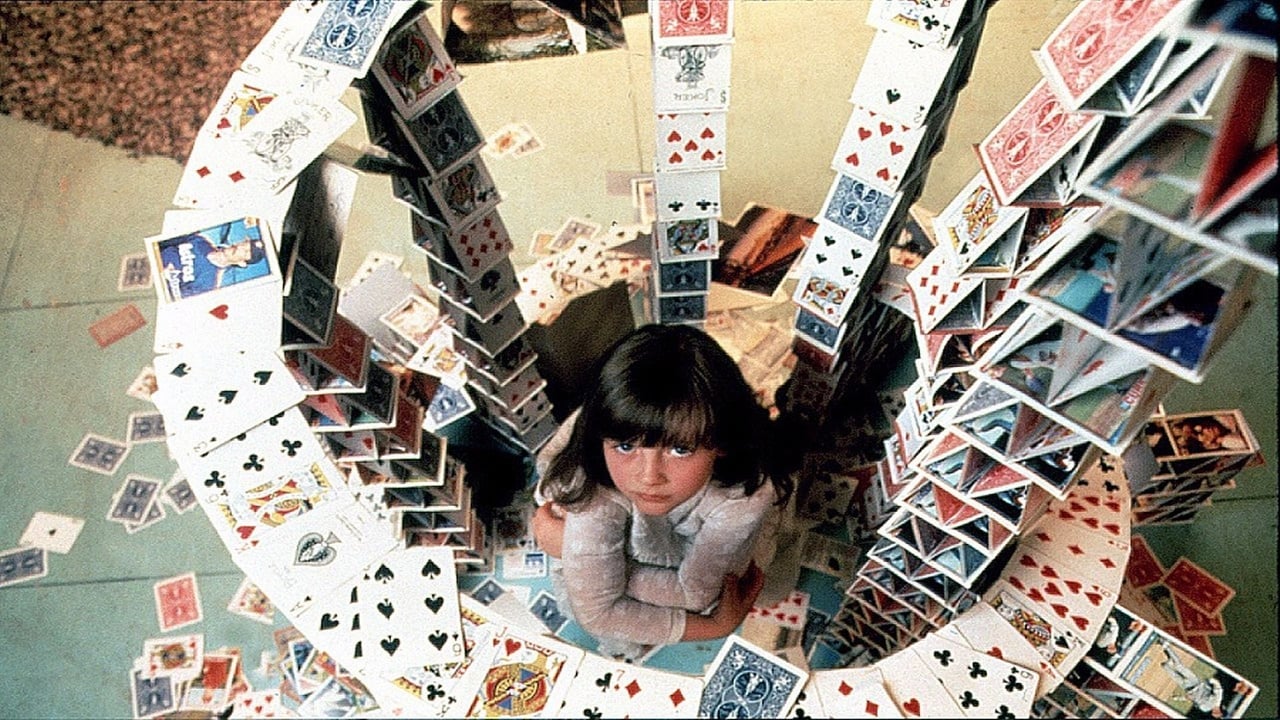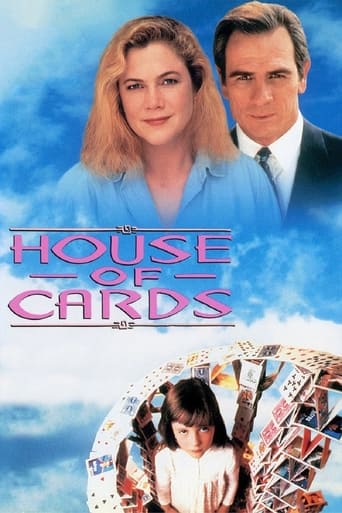Supelice
Dreadfully Boring
Teringer
An Exercise In Nonsense
Senteur
As somebody who had not heard any of this before, it became a curious phenomenon to sit and watch a film and slowly have the realities begin to click into place.
filippaberry84
I think this is a new genre that they're all sort of working their way through it and haven't got all the kinks worked out yet but it's a genre that works for me.
piquichi
This movie is very interesting to watch and the characters are well-acted by Kathleen Turner and Tommy Lee Jones. The little girl is very convincing as well. It's a good movie, but people should know: this is not about autism.I have an autistic daughter. Even in regressive autism, which is not that common, you don't just become autistic through emotional trauma, as this movie suggests. And you don't just stop talking one day. It's a progressive or, rather, regressive thing. And regressive autism takes place about age 2-3, not age 6. Her seeming imperviousness to danger is autistic-like and the screams when things change is something that can happen, but please don't come away from this movie thinking this is what autism is.Many autistic children are not silent and do interact or try to. Take note of the scenes at the school with real autistic children to get a somewhat better picture.This movie is more about emotional trauma than autism. Leading the viewer to believe otherwise is a tragic disservice. But what's worse is then leading the viewer to believe simple psychological intervention will "fix" autism.The one good thing is that the movie shows autistics to be bright and very creative. If you want to learn something about autism, learn that.
Morgaine Swann
House of Cards is a really unusual story, and you have to really pay attention to understand what is going on. It juxtaposes modern medicine with Mayan ritual, but you have to listen to the conversations with the Mayan man and Sally (Asha Menina) to understand what she's going through. I'll try not to give too much away, but I have to talk about the ending because that is what is confusing people. The movie begins with the father dying from a fall at an archaeological dig in South America. The little girl is only about 5, but she's multilingual, speaking Spanish and a native Mayan dialect fluently as well as English. We hear Sally's memories as narration, the Mayan man that she spent so much time with telling her how to become very quiet, how to deal with her grief, and that her father now lives on the moon. The family leaves for the States shortly after the father's death, so this little girl who has only really known the people at the site is taken from an extended support system to a rural American setting. Her mother and brother are so caught up in the move and their grief that they don't really notice Sally has stopped talking. As she begins to exhibit extraordinary powers like climbing and throwing or catching a ball with freakish ability, the brother notices but doesn't really tell their mom.Sally's "symptoms" create concern in the local authorities when she climbs up building equipment trying to reach the moon, where she's been told her father is now. They only manage to get her down because the worker that goes after her is Native American and she trusts him. No one ever mentions this in the movie, but he's the only one she responds to during her mourning spell. A therapist who is assigned to deal with Sally and her family struggles to define the problems and the extreme gifts demonstrated by Sally. He's using modern techniques that are unable to reach the girl. Her behavior becomes more bizarre, and more beautiful, leaving him to struggle with the idea of whether we enter or withdraw from the world through creativity. In the end, the mother, played by Kathleen Turner, follows her instinct and builds a tower based on the design of Sally's house of cards. No one connects the fact that Sally's structure ended with a Major Arcana Tarot card, The Moon, and that the tower appears to be directly under the moon, as in the card. The Native man from the construction site helps the mother, as do friends and family, though they don't understand what she's doing. When the tower nears completion, the mother falls asleep on it, and she connects with Sally in a dream. She's awakened by the doctor coming across the field, where he found Sally headed for the tower. This is where most people get lost. Sally and her mother work the problem out on an inner plane. From the outside, they appear to just be staring at each other. On the inside, Sally is expressing her grief, says good bye to her daddy, and comes back to her mom. Once Sally lets go of her dad, she is back to normal. She has no memory of her "quiet" time.Sally's journey is a vision quest, and her mother intuitively reaches her with a ritual based on the symbols Sally has been taught. No one in the movie understands how it happens or why, so if you aren't familiar with Native American spirituality, it won't make sense - though it is still poetic and beautiful, if you let go of trying to make it fit your expectations. I highly recommend the movie, especially for family viewing.
accadaffa
I was hooked on the story, having many friends with autistic children. The acting was enjoyable and drew me in to the story but the end was unsatisfying for me. I wasn't quite sure what was happening toward the end of the film. The symbolism was not sufficiently supported by the storyline so as a viewer I was cast adrift to make my own interpretations.The little girl was cute and played her part well as did her big brother. Tommy Lee's performance was a little uneven for me. I could see him straining to find his character at times. Ms Turner was as good as ever.
przgzr
If anyone wants to know medical facts about any disease, he/she should read medical literature, ask a doctor, watch educational program on TV. This is a movie, so the authors have their freedom. Of course, they have certain responsibilities. They shouldn't show obvious mistakes and let us believe they're medical facts (or any other scientific facts) when the movie ends. I can understand upset parents who have to live with their own private horror and know it will last whole life through (without miracles after waking up), but in the end it is clearly shown this was not a case of autism. Traumas can cause extremely different pictures. In adults you can spend months and years searching for somatic cause for headaches, cardiac disorders, or even blindness before it becomes apparent there isn't any. Schizophrenic catatonia is an extreme example, showing neurological symptoms. In children one can find regression (behaving like a younger child) - like enuresis after even many years of successful urinary control. But behavior like autism is also possible. (I don't remember anyone objecting "Tommy", by the way, maybe because it's much more symbolic than the realistic "House of cards".) And traumas for children are often also trauma for adults (parents) who sometimes don't let the physician know the whole truth. Sometimes they're ashamed, sometimes feel guilty, sometimes diminish the cause or even have problems to deal with it themselves, so they deny it can have reflection on health of their child. These parents can also be expected to change doctors or institutions or the way of treatment. Especially in modern world when media give a great space to non-medical treatments, because they sell newspapers (or TV shows) more than real science and completely educated professionals. That can confuse parents, already shocked by disease and afraid of future, progressively with the seriousness of the diagnosis. The way media treat "official medicine" is also important. If their glorify different kinds of magicians and a real doctor can never be heard, let alone become a hero, you can expect parents with lack of belief and very much ready to try another approach, no matter how useless, unsuccessful and even harmful (at least because it means losing precious time). So however unrealistic and hard to watch for real autistic children's parents, this film is honest, even realistic (parents who believe their doctors must understand that there really exist parents who don't!) - and (last but not least) this film is good as a film. It is meant to enjoy it and not to teach medicine. And if you ask yourself some questions it can even upset you (but try "Lorenzo's Oil" if you want it deeper than your skin).Also, some comments (and mine too) could be more adequate in Message boards, so I suggest for any more comments like this Message board to be used, and this place left to viewers who want to give opinions about the movie.

